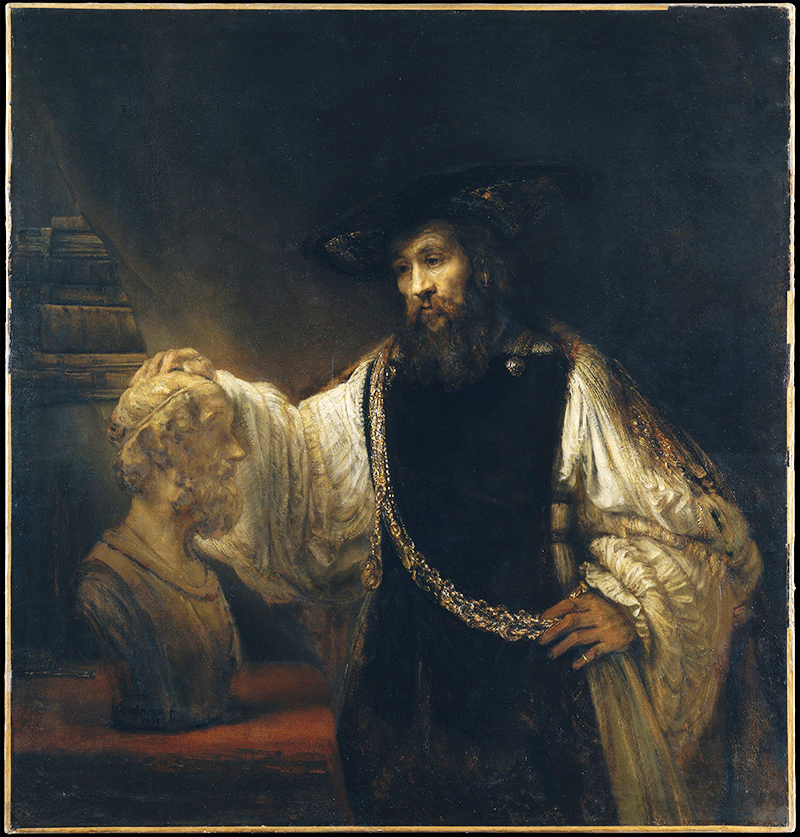BREAKING THE CHAINS OF SUFFERING
Leave a CommentLife is one of the greatest gifts that has been bestowed upon us. Life is also very kind and sometimes very unfair, It brings good and bad to our lives depending on our actions and the decisions we make. The greatest good lies in reason and virtue. While the bad can come in many forms such as Unpleasantness, unhappiness, misery, affliction, discomfort, ill and sorrow. All which eventually lead to suffering. One should consider liberating one self from suffering and instead replacing it with the practice of compassion, and the aiding and understanding of others as a basic for leading a holy life and attaining nirvana. One should begin with one’s self. We must change from with in to be able to project healthy emotions on to others. “You cannot give what you don’t have”
Aristotle contemplating the bust of Homer by Rembrandt
Continuing my discussion of my faculty book group’s current work, Elizabeth Spelman’s Fruits of Sorrow: Framing Our Attention to Suffering, today I look at what Aristotle teaches us about how we approach suffering. A key work is hisPoetics, where he explores what constitutes a tragic hero. Spelman says that Aristotle’s influential formulation blinds us to much of the suffering in the world because he considers only a small number of cases to be tragic:
An Aristotelian tragedy, then, is about exemplary human suffering. Not all suffering is exemplary, not all of it is representative of important facts about human life. By Aristotelian criteria (and here of course he is not alone), suffering is not tragic in and of itself. It cannot be trivial: it cannot be that of an insignificant or base person, nor even the minor trials and tribulations of a good if not “preeminently good” man. What makes a poetic account of such suffering universal is that it is about important kinds of things likely to happen to a certain kind of man; but such an account is not tragic unless it arouses the pity and fear of those who hear it.
It’s a big deal for our suffering to be labeled tragic, Spelman says. That’s because tragedy snatches suffering out of its “threatening, chaotic horribleness.” As tragic figures, we no longer, in the words of poet Audre Lorde, experience “unscrutinized and unmetabolized pain.” Instead, as Spelman puts it, our suffering is “diluted to some manageable degree by its riveting intelligibility.”
Labeling something tragic, in other words, allows us to make a certain kind of sense of it. We understand the flaws of an Oedipus or a Lear and are thereby able to fit their suffering into some kind of framework.
Spelman contrasts Aristotle’s approach with Plato’s. Where Plato worries that we will be engulfed by our own grief as we watch a tragedy, Aristotle says that tragedy teaches us the appropriate way to pity and fear. Spelman quotes Martha Nussbaum on the subject:
Through attending to our responses of pity, we can hope to learn more about our own implicit view of what matters in human life, about the vulnerability of our own deepest commitment.
Spelman elaborates, “One leaves a good tragedy not so much having spent one’s emotions as having enlarged one’s understanding of them and their appropriate place in human life.”
Bacchus By Caravaggio
“IN VINO VERITAS”
They say that Little kids and people who are Drunk seldom lie. They always seem to tell the truth about things or as they say they have no hairs in their tongues. While on the other hand us as adults we tell our selfs so many lies, we create horrible stories of discouragement for our selfs. We tell our selfs we can’t do this or that. We constantly bring down our self-stem instead of becoming our best friend. We need to become the person who can understand us the best the one who say yes it is possible, yes you can do it. Only then can we take a step forward towards success and begin the beautiful and sometimes difficult road to attaining abundance of peace and happiness.
What motivates you, what drives you, who do you love , what do you live for, who loves you. Ask your self the right question to get the right answers and most important be very honest with your self and good luck on your journey in search of what makes you happy.
Jose Lopez
Your friend and artist.


